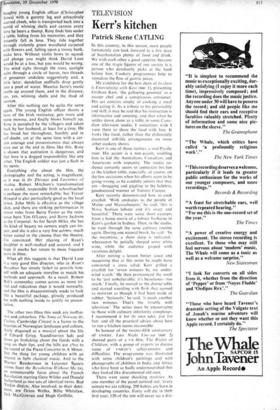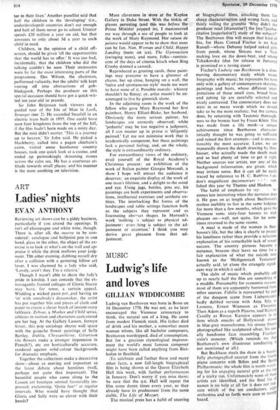TELEVISION
Kerr's kitchen
Patrick Skene CATLING
In this country, in this season, most people fortunately can look forward to a few days of bacchanalian plenty of food and drink. We wish each other a good appetite, because one of the tragic figures of our society is a person who desultorily picks at the food before him. Cookery programmes help to stimulate the flow of gastric juices.
My candidate for the best show of its class is Entertaining with Kerr (Bnc 1), presenting Graham Kerr, 'the galloping gourmet' as a master chef and a conspicuous consumer. His act consists simply of cooking a meal and eating it. As a tribute to his personality and skill, it may be said that his instruction is informative and amusing, and that when he settles down alone at a table in some Cana- dian television studio, I sometimes wish I were there to share the food with him. It looks like food, rather than the elaborately decorated still-life arrangements on some other cookery shows.
Kerr is one of those rarities, a mid-Pacific man. His accent is a non-accent, enabling him to kid the Australians. Canadians and Americans with impunity. The studio au- dience certainly seems to appreciate his fun at the kitchen table, especially, of course, on the few occasions when his efforts seem to be going wrong, as he candidly admits that they are—shrugging and giggling in the helpless, goodnatured manner of Tommy Cooper.
Kerr recently demonstrated how to cook crayfish. `With apologies to the people of Maine and Massachusetts.' he said, 'this is Nova Scotian lobster and it's sweet and beautiful.' There were some short excerpts from a home movie of a lobster barbecue in Kerr's garden in Sydney. Then. in the studio, he went through the same culinary routine again. During one natural break. he said : 'In the meantime, a short slurp is indicated.' whereupon he genially slurped some white wine, while the audience gasped with vicarious delight.
After mixing a lemon butter sauce and suggesting that at this point he might have concocted a cress salad, Kerr grilled a crayfish for 'seven minutes by my under- wind watch.' He then pronounced the smell to be 'just unbelievable: it's beauteous—too much.' Finally, he moved to the dining table and started wrestling with flesh that seemed as resistant as though it had been made of rubber. 'Seriously.' he said. 'it needs another two minutes. That's the trouble with television.' The series must be encouraging to those with culinary inferiority complexes.
recommend it for its own sake, just for fun: and all the practical advice about how to run a kitchen seems reasonable.
In honour of the twenty-fifth anniversary of UNICEF, Late Night Line-up (Bac 2) showed parts of a uN film. The Rights of Children, with a group of experts to discuss some of UNICEF'S achievements and difficulties. The programme was illustrated with some children's paintings and with photographs of children in India and Africa who have been so badly undernourished that they looked like discontented old men.
There were some shocking statistics. As one member of the panel pointed out, 'every minute we are talking, 200 babies are born in developing countries. Forty will die in their first year, 120 of the rest will never see a doc- for in their lives.' Another panellist said that half the children in the 'developing' (i.e., underdeveloped) countries don't eat enough and half of them never go to school. UNICEF spends £20 million a year on aid, but that amounts to only about 5d a year to each child in need..
Children, in the opinion of a child off- screen, should be given 'all the opportunities that the world has to offer.' It was too bad, incidentally, that the children who did the talking couldn't be seen. Their statements were by far the most interesting parts of the programme. Des Wilson, the chairman, pefformed valiantly, but the adults' talk kept veering off into abstractions of gob- bledygook. Perhaps the producer on this special occasion should have got a quick-wit- ted ten-year-old to preside.
Sir John Betjeman took viewers on a guided tour of the Isle of Man in Look, Stranger (Bac 2). He ascended Snaefell in an electric tram built in 1895. One could have seen four kingdoms from the top of the hill, if the film hadn't been made on a misty day. But the mist didn't matter. 'This is a journey up to heaven,' Sir John said. He picked a blackberry, called into a pagan chieftain's cairn, visited some handsome country houses, took one quick look at a casino, and ended up painstakingly skimming stones across the calm sea. He has a courteous at- titude towards small places; and his manner is the most soothing on television.







































 Previous page
Previous page